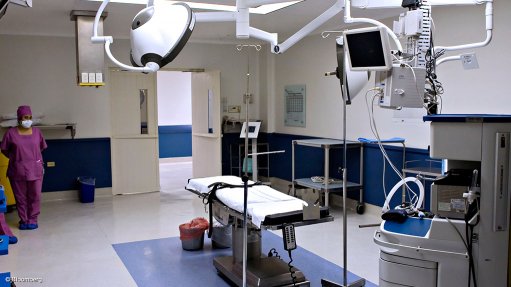
Photo by: Bloomberg
The South African Medical Association (SAMA) says it does not support the National Health Insurance (NHI) Bill in its current form.
According to the association, the bill was developed with disregard to the legitimate concerns and recommendations of experts, particularly on critical issues such as the introduction of contracting units for primary healthcare (CUPs), benefits packages and reimbursement models, among others.
On Friday, the parliamentary Portfolio Committee on Health considered and adopted the NHI Bill, which will now be debated in the National Assembly.
The bill, which was introduced in Parliament in August 2019, seeks to realise universal health coverage for all, which means that every South African will have a right to access comprehensive healthcare services free of charge at accredited health facilities such as clinics, hospitals and private health practitioners.
The bill seeks to "create mechanisms for the equitable, effective and efficient utilisation of the fund's resources to meet users' health needs".
However, SAMA spokesperson Dr Mvuyisi Mzukwa said there were significant concerns with regard to the provision of healthcare services to patients in the country, should the bill be taken forward.
"While universal health coverage as envisaged in the objectives of the bill intends to improve the health and livelihoods of the citizens of South Africa, [the] NHI Bill in its current form sets up the healthcare system for failure at the expense of further deterioration of the health and wellbeing of all who live in the country," Mzukwa said.
He said trust in the government's ability to efficiently manage the over R500-billion budget was severely eroded, particularly due to the mismanagement of Covid-19 funds.
"Misappropriation of funds in various State-owned entities casts doubt on government's ability to handle the health care budgets responsibly. The public, alongside healthcare stakeholders, cannot simply entrust their lives to a government with an established history of financial mismanagement," he said.
Mzukwa said SAMA believed that a robust approach to strengthening health systems was indispensable as it would rectify the current deficiencies and overcome the challenges posed by the NHI.
"This approach seeks to enhance the efficiency, effectiveness and resilience of the healthcare system, ensuring optimal care delivery to all individuals. Governance within the healthcare sector must be strengthened with transparency and accountability. Effective management of funds and meticulous budget allocation is imperative to rebuild trust and demonstrate responsible stewardship of public resources," Mzukwa said.
The South African Medical Association Trade Union (Samatu) spokesperson Bokang Motlhaga said the union was looking into the matter to ensure they had their facts in order.
"We are not ready to comment now," Motlhaga said.
According to the bill, the NHI fund will cover South Africans of all races, rich or poor, as well as legal long-term residents. There will be one pool of healthcare funding for private and public healthcare providers alike.
When people visit healthcare facilities, the idea is that the NHI Fund would cover the costs of medical care in the same way medical aids pay for their members.
According to the bill, South Africans will no longer be required to contribute directly to a medical health scheme for quality healthcare.
The NHI Fund will be funded from general taxes and monthly contributions by employees to the fund.
Employers will assist the NHI Fund by ensuring that their workers' contributions to the NHI fund are collected and submitted, in a similar manner to UIF contributions.